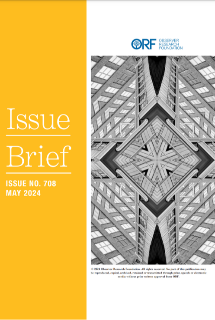India, as a development partner, must focus on a few niche areas in which it has an advantage, said participants at a panel discussion on ’India-Africa Summit 2015: Outcomes and the Way forward’ on November 18 at the ORF-Delhi campus.
Participating in the closed door discussion, they pointed out that the broad areas of cooperation between India and Africa are capacity building, infrastructure, health, energy, and spread of information technology.
The objective of the event was to get a deeper understanding of the outcomes of the India-Africa Forum Summit 2015 and discuss how the Framework of Strategic Cooperation between India and Africa will be implemented. The discussion was preceded by short presentations by Dr Vikrom Mathur and Malancha Chakrabarty.
Dr Vikrom Mathur introduced ORF’s India-Africa Development Forum, which will focus on food security, agriculture, gender and health issues. He also mentioned that ORF will engage with African think-tanks and work closely with the Department for International Development.
Malancha Chakrabarty argued that economic ties between India and Africa are much more important today than in the past. She posed four questions for the panel: What will be the prime focus of India-Africa relations in the future - which areas will drive the agenda? What would be the role of Indian private sector, civil society organizations, and the media in India-Africa relations? How will India achieve a balance between its engagement with Africa at the regional level and through bilateral cooperation with individual African countries? What role can institutions like ORF play in facilitating and monitoring of the growing partnership?
The panel discussion was framed by the Chair, Mr. HHS Viswanathan, Distinguished Fellow, ORF, and a former Ambassador to African countries. According to him, the third India-Africa Forum Summit stood out in three ways. Firstly, unlike previous summits, all 54 African countries participated in the summit. Secondly, there has been a change in the narrative in favour of what India and Africa can do together. Thirdly, there is greater emphasis on the role that India and Africa can play in the international arena.
Scholarships to African students also form a large component of India’s development cooperation with Africa. India has offered more than 50,000 scholarships to African students. Indian credit lines to Africa are typically directed to infrastructure related projects such as energy and water supply, farm mechanization, power transmission, and roads etc. Renewable energy technologies and hydrocarbons are critical components of India’s energy cooperation with Africa.
According to one of the participants, the progress on institution building in Africa has been less than satisfactory. Therefore, the decision to form a joint monitoring mechanism to review the implementation of the 2015 India-Africa Framework for Strategic Cooperation is a positive development. With regard to security issues, India and Africa will cooperate on maritime security issues such as piracy and counter-terrorism.
India’s EXIM bank’s activities in Africa are mainly directed to infrastructure, engineering and capital goods rather than commodities. The EXIM Bank has extended 144 Lines of Credit worth US$ 7 billion have been extended to Africa since the launch of the IDEA (Indian Development and Economic Assistance) Scheme. In addition, EXIM Bank also has a quasi-concessional scheme in Africa the form of buyer’s credit under the National Export Insurance Account (NEIA). It also has commercial relations with regional development banks such as PTA Bank (Eastern and Southern African Trade and Development Bank). One of the participants mentioned about EXIM Bank’s joint venture with the African Development Bank, State Bank of India and Infrastructure Leasing and Financial Services Ltd, the Kukuza Project Development Company, which will develop bankable projects in Africa.
India’s Duty-Free Tariff Preference (DFTP) Scheme has also not been very successful in boosting trade ties between India and Africa. Only 23 African countries out of 34 eligible countries have sent letters of intent to take advantage of this scheme. One of the participants informed that apart from Tanzania, no other African country has seen an increase in its exports under this scheme. India’s private sector’s response to SITA (Supporting India’s Trade Preferences for Africa) Project has also been less than satisfactory. Indian companies would gain by setting up units in Africa and exporting to India under the DFTP scheme. Moreover, Africa could be a gateway for exports to developed country markets because African countries have zero duty access to all major markets of the world whereas India has lost its preferential status. To facilitate the spread of Indian businesses in Africa, there is a need for greater regional integration in Africa.
In response to a question on India’s development cooperation with fragile states in Africa, a participant said that fragile states in Africa have not been the largest recipients of Indian credit lines. With regard to the delay in the implementation of credit lines, another participant said that infrastructure projects typically have long gestation periods and financial disbursements are linked to project milestones.
The views expressed above belong to the author(s). ORF research and analyses now available on Telegram! Click here to access our curated content — blogs, longforms and interviews.




 PREV
PREV

